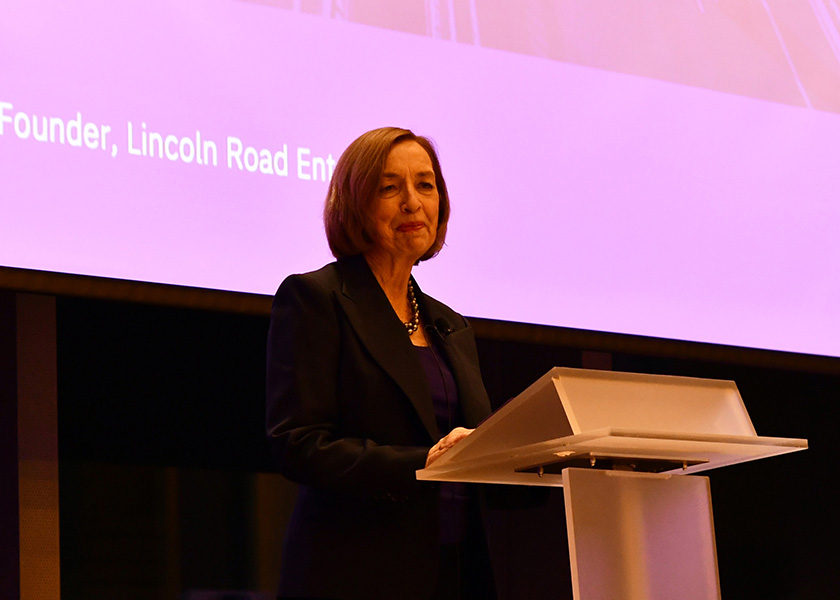Ann Drake Stresses Pandemic Lessons During Patterson Lecture
Drake said the pandemic has driven home the supply chain’s vulnerability
For the past three decades, manufacturers have pushed to keep days of inventory as low as possible, relentlessly telling suppliers to provide materials when needed. At the same time, consumers had gotten used to getting what they wanted when they wanted it thanks to e-commerce, igniting a supply-chain arms race.
Even with the implicit challenges, that system was generally working until the COVID-19 pandemic.
“If I can borrow the urban legend about the boiling frog, we were sitting in the pot for some time, not noticing how hot the water was getting,” said Ann M. Drake (Kellogg ’84 MBA), president and founder of Lincoln Road Enterprises, a women’s leadership organization she started in 2019. “It took the pandemic to show us that the supply chain we tried to think of linearly, logically as a string of individual bits we could manage and study was actually an ecosystem, a brittle well of interdependencies in a dynamic environment wherein if one element changes, the whole system torques.”

Introduced by Hani Mahmassani, director of the Northwestern University Transportation Center (NUTC) and the William A. Patterson Distinguished Chair in Transportation and professor of civil and environmental engineering and (by courtesy) industrial engineering and management sciences at Northwestern Engineering, and Kellogg School of Management Dean Francesca Cornelli, Drake delivered the 39th William A. Patterson Transportation Lecture held November 17 at the Kellogg Global Hub.
Prior to starting Lincoln Road Enterprises, Drake was chairman and CEO of DSC Logistics (now CJ Logistics), helping to transform supply chain management into a critical and creative business strategy based on collaborative partnerships.
Sponsored by the NUTC, the address “Beyond Transportation Excellence: Lessons from the Pandemic” was especially well-timed. Material shortages have pushed the Consumer Price Index up 6.2 percent over the past year, and supply chains have been stretched especially thin recently.
The pandemic, Drake said, has handed business big lessons very fast, driving home how vulnerable the supply chain actually is. They are lessons that might have taken generations to learn, but instead, everybody is getting a crash-course.
Respect the supply chain
In the past, the most talented businesspeople didn’t go into supply-chain management because it wasn’t the path to the C-suite. That’s changed recently, as supply-chain experts are making their way into the boardroom.
“We are finally waking up to the fact that the supply chain is how every tangible thing in this world happens,” Drake said.
We all need to become systems thinkers
The pandemic will end eventually, but there will always be challenges waiting in the wings. Climate change, Drake said, will generate a number of those future shocks as the global supply chain is the largest source of carbon emissions in the world. Building more resilient systems is a key, and figuring out where to source materials continues to be important.
Each choice, though, has its own merits and consequences.
“The point is to think about the possible ripples before choosing and to use a bigger metric than cost containment,” Drake said.

Collaboration is the currency of the 21st century
Drake learned that principle from Dipak Jain, the former Dean of Kellogg. Businesspeople are trained to think there’s only so much pie available, necessitating competition for each slice. What if, Drake asked, we could make more pie? When she was at DSC, Drake said she would watch different profit centers at the same company compete against each other because nobody was asking them to collaborate for the larger good.
“If we keep looking at discrete costs of supply-chain elements and don’t look at total-system costs, we will miss the game,” Drake said. “We will keep pitting suppliers against each other in a kind of supply chain Squid Game until we bleed everyone dry. I’ll propose that collaboration is not the death of competitive advantage, but the way to a future in which agreeing on shared costs, shared goals, and working together to achieve them creates success.”
Practice transparency
Even though the world is awash in data, there’s too much in some places and not enough in others. One factor slowing recovery during the current crisis is difficulty identifying choke points because mid-tier suppliers and others are afraid to share their information. They might be scared that knowledge could be used to replace them or cut their profits, meaning partners shield data.
“When we all own up to our own interdependence in the global supply chain, we see that your problems become my problems very quickly and vice versa,” Drake said.
The thinking that got us here is not the thinking that will get us out
In 2012, Drake became the first woman to receive the Distinguished Service Award from the Council of Supply Chain Management Professionals, the industry’s highest honor. That night during her acceptance speech, Drake quipped “Remember when this used to be all men?” Then she looked up at the audience and thought – it still is.
In response, Drake founded Achieving Women’s Excellence in Supply Chain Operations, Management and Education (AWESOME), which is the preeminent community for women in supply chain roles. AWESOME’S mission is to advance and transform the future of supply chain leadership, and boasts a membership of more than 1,500, including executives at numerous leading companies.
The most gender-diverse companies, Drake said, are 21 percent more likely to outperform on profitability because they draw upon a larger, more diverse talent pool with more diverse viewpoints and ideas. While that diversity lags in most industries, according to a survey released in 2020 by AWESOME and business insight company Gartner, 17 percent of top jobs in surveyed organizations are held by women, up from 9 percent five years ago.
“I have seen women rise exceptionally well to challenges the supply chain represents,” Drake said. “Not just supply chain, but supply chain during the pandemic. What makes them good? The ability to collaborate across borders, across departments, across oceans. They are boundaryless in their thinking, they are gifted at systems thinking, communicating, collaborating, consensus building, and sharing information.”